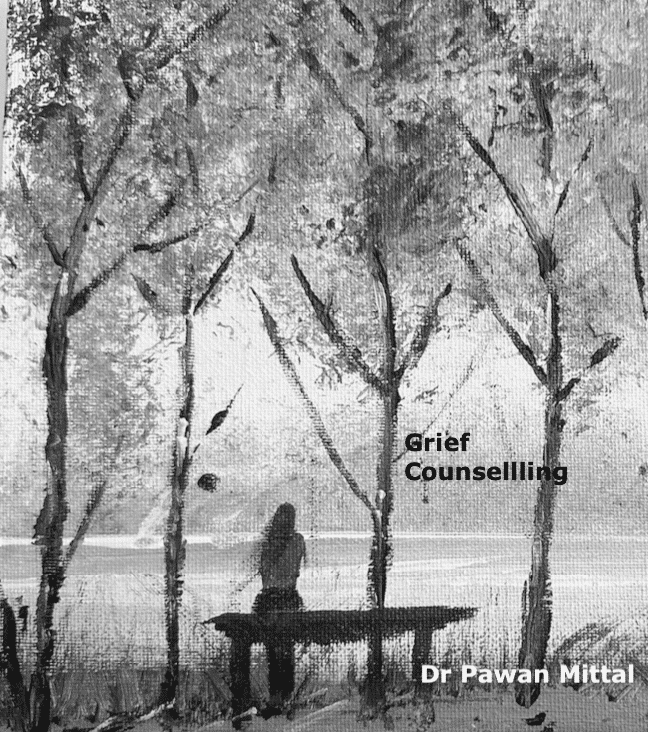Admission
Be part of research team and get certificate
Work under supervision of research scholars doing PhD in Psychology counselling
Psychology counselling internship
Online video consultations with clients
Learn to independently manage clients from home at convenient time. Commitment of 10 hours per week mandatory
Offline internship at partner hospital
Manage clients under supervision at partner hospital
History taking, counselling under supervision. Commitment of 9 hours daily mandatory
Learn documentation for research
Assist in documentation and compliance for research
Medical records, consent, research documents
Develop Practical counselling skills
Manage clients independently
Start with supervised consultations and enhance to managing independently
Be part of research team
Contribute to bigger mission
Find life's purpose and get an opportunity to work lifetime in the field
Develop new tools and tests
Contribute through practice and research on clients
for development of grief counselling tools.
Apply to become research member
Process of Grief counselling
Grief counseling typically involves five stages, often following the Kübler-Ross model:
1. Denial: This stage involves disbelief and a refusal to accept the reality of the loss.
2. Anger: People may experience frustration, irritation, or rage as they grapple with their emotions.
3. Bargaining: Individuals may attempt to negotiate or make deals in an attempt to change the circumstances of the loss.
4. Depression: Feelings of sadness, loneliness, and despair are common as the reality of the loss sinks in.
5. Acceptance: Finally, individuals come to terms with the loss and begin to adjust to life without the person or thing that was lost.
It’s important to note that not everyone goes through these stages in a linear fashion, and some may not experience all of them. Grief is a highly individual process, and grief counseling aims to provide support and guidance tailored to each person’s unique experience.
Things not to say to a grieving person
When speaking to someone who is grieving, it’s important to be sensitive and supportive. Here are some things to avoid saying:
- “I know how you feel.”: While well-intentioned, this can come across as dismissive because everyone’s grief is unique.
- “You should be over it by now.”: Grieving doesn’t have a timeline, and it’s important to allow the person to process their emotions at their own pace.
- “It’s all part of God’s plan.”: Religious or philosophical statements about the nature of loss may not be comforting to everyone and can feel invalidating.
- “At least they’re not suffering anymore.”: While this may be true, it can minimize the person’s pain and make them feel guilty for grieving.
- “You should be grateful for the time you had.”: This can make the person feel guilty for feeling sad or angry about their loss.
- “You need to be strong for others.”: Putting pressure on the person to suppress their emotions can be damaging and prevent healthy grieving.
- “You’ll find someone/something else.”: This can invalidate the significance of the loss and make the person feel like their feelings are not being acknowledged.
- “Time heals all wounds.”: While time may lessen the intensity of grief, it doesn’t necessarily heal it completely, and it can feel dismissive of the person’s current pain.
Instead of trying to minimize or fix the person’s grief, it’s often more helpful to simply listen, offer empathy, and let them know you’re there for them.
Things to say to a grieving person
When speaking to someone who is grieving, it’s important to convey empathy, support, and understanding. Here are some things you can say:
- “I’m so sorry for your loss.” : This simple phrase acknowledges the person’s pain and shows that you’re there for them.
- “I can’t imagine what you’re going through, but I’m here for you.” : Recognizing the uniqueness of their experience while offering your support can be comforting.
- “It’s okay to feel however you’re feeling right now.” : Assure them that whatever emotions they’re experiencing—sadness, anger, confusion—are valid and normal.
- “I’m here to listen if you want to talk, but I understand if you don’t.” : Let them know you’re available to lend an ear if they need to express their feelings, but respect their need for space if they’re not ready.
- “Would you like some company, or would you prefer to be alone?” : Offer to be present for them, but also respect their need for solitude if that’s what they prefer.
- “It’s okay to take things one day at a time.” : Encourage them to focus on getting through each day rather than feeling overwhelmed by the future.
- “I remember [the deceased] fondly. Would you like to share some memories?” : Sharing positive memories of the person who passed away can be comforting and validating.
- “Let me know if there’s anything specific I can do to support you.” : Offer practical help, such as running errands, cooking meals, or assisting with funeral arrangements.
Ultimately, the most important thing is to convey genuine care and support, letting the grieving person know that they’re not alone in their pain.
Qualities of good grief counsellor
A good grief counsellor possesses a combination of professional skills, personal qualities, and ethical principles to effectively support individuals coping with loss. Here are some qualities:
- Empathy: The ability to understand and share the feelings of the grieving person is essential. Empathy helps the counsellor connect with the client on an emotional level and provides a supportive environment for healing.
- Active listening: A good grief counsellor listens attentively to the client without judgment or interruption. They allow the client to express their emotions and thoughts freely, creating a safe space for exploration and processing.
- Compassion: Beyond understanding, a compassionate counsellor demonstrates genuine concern for the well-being of their clients. They offer comfort, validation, and encouragement throughout the grieving process.
- Knowledge and expertise: A competent grief counsellor has a solid understanding of grief theories, counseling techniques, and interventions. They stay updated on current research and best practices in grief counseling to provide effective support.
- Respect for diversity: Grief manifests differently across cultures, religions, and individual experiences. A good counsellor respects and honors the unique background and beliefs of each client, adapting their approach accordingly.
- Boundaries: Maintaining professional boundaries is crucial in grief counseling. A counsellor knows when to provide support, when to challenge unhealthy coping mechanisms, and when to refer clients to other professionals for specialized care.
- Patience and flexibility: Grief is a complex and nonlinear process that unfolds differently for each person. A good counsellor is patient and flexible, adapting their approach based on the client’s needs and pace of healing.
- Self-awareness: Counsellors must be aware of their own biases, emotions, and limitations to provide effective support. They engage in ongoing self-reflection and supervision to ensure their work remains ethical and effective.
- Communication skills: Clear and effective communication is essential in building trust and rapport with clients. A good counsellor conveys information, insights, and feedback in a way that is understandable and respectful.
- Ethical integrity: A trustworthy grief counsellor adheres to ethical guidelines and professional standards in their practice. They prioritize the well-being and autonomy of their clients, maintaining confidentiality and avoiding conflicts of interest.
channelising grief to positive energy to achieve success in life
Channelising grief to positive energy to achieve success in life
Turning grief into positive energy can be a transformative process, helping individuals find meaning, growth, and resilience in the face of loss. Here are some ways to channel grief into positive energy and achieve success in life:
- Acknowledge and accept emotions: Allow yourself to feel and express the full range of emotions that accompany grief, including sadness, anger, and fear. Acknowledging these feelings is the first step towards healing.
- Seek support: Surround yourself with supportive friends, family members, or a therapist who can provide comfort, understanding, and guidance during difficult times. Sharing your grief with others can lessen the burden and facilitate healing.
- Find meaning: Explore ways to find meaning and purpose in the midst of grief. This could involve reflecting on the lessons learned from the loss, cherishing memories of loved ones, or finding ways to honor their legacy.
- Set goals: Channel your grief into motivation by setting meaningful goals for yourself. Whether it’s pursuing a career aspiration, starting a new hobby, or engaging in volunteer work, having a sense of purpose can provide direction and focus.
- Practice self-care: Take care of your physical, emotional, and mental well-being during the grieving process. Engage in activities that nourish your body and soul, such as exercise, meditation, journaling, or spending time in nature.
- Cultivate resilience: Grief can be a catalyst for personal growth and resilience. Embrace challenges as opportunities for learning and development, and cultivate a mindset of resilience that enables you to bounce back from adversity stronger than before.
- Give back: Turn your grief into positive energy by giving back to others in need. Volunteering, supporting charitable causes, or helping those who are experiencing similar struggles can provide a sense of fulfillment and purpose.
- Celebrate achievements: Acknowledge and celebrate your successes, no matter how small they may seem. Recognize the progress you’ve made on your journey towards healing and success, and take pride in your resilience and determination.
- Practice gratitude: Cultivate an attitude of gratitude by focusing on the blessings and positive aspects of your life, even in the midst of grief. Expressing gratitude can shift your perspective and foster a sense of hope and optimism.
- Stay connected: Maintain meaningful connections with others and stay engaged in your community. Lean on your support network for encouragement and inspiration, and remember that you are not alone on your journey towards healing and success.
Table of Contents

